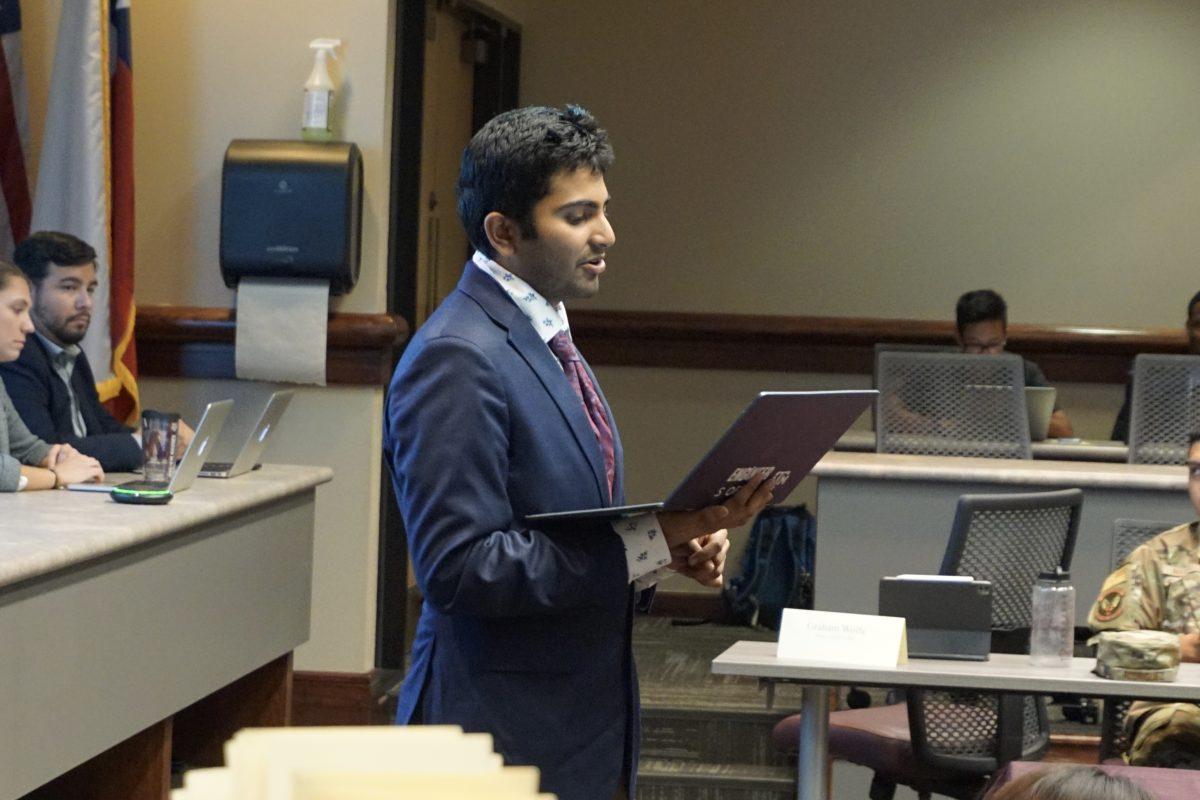On Aug. 31, I did something I had never done before — attend a Student Senate meeting.
Waiting outside the doors to be let in, I figured there would be more curious onlookers. After all, the Senate’s website claims it’s “the true governing body of the students.” To my suprise, the only people there were the senators, who are required to attend, me and the guy that came in about an hour late. So I guess make that two students who thought sitting in Koldus would be a productive use of their Wednesday evening.
Surprisingly, it was. Aside from long-winded debates on internal Senate regulations, many interesting and important items were brought to the floor. Long Range Staff Planner for the city of College Station Matthew Ellis presented proposed new zoning regulations that would directly affect student housing options. Finance sophomore Cade Coppinger presented his plans to increase cooperation between Texas A&M’s Student Government Association and other SEC schools’ student governments. Coppinger, alongside finance senior Sam Presnal, was then unanimously confirmed to the executive cabinet of Student Body President Case Harris.
A lot is happening in the Senate, yet most students will probably never hear about it.
“I would say I know relatively nothing about Student Senate,” business sophomore Emi Autry said. “I know we vote on Student Senate, but I’m not sure what they do after they are elected or any of the things they are responsible for or how they impact us.”
There is a fundamental disconnect between students and their representatives. We all see candidates posting on social media, the classic campaign pitch in front of the 12th Man statue and Election Day TikToks, trying to drum up votes for their candidacy. But after voting ends? Crickets.
To be fair, the Student Senate does many things right. Before every meeting, the A&M Student Senate Twitter account tweets out the major pieces of legislation that will be voted on. Given that not all students regularly use Twitter, the Student Senate also live streams the meetings on Facebook, making it accessible for anyone who’s interested.
However, the numbers speak for themselves. Only 12,630 ballots were cast in last spring’s student body election, which is a mere 18.8% of all eligible voters. Though this may be a slight improvement from earlier years, it is still a tiny portion of the student body. One reason for the low turnout is simple — we students are busy. After a day of classwork, studying, possibly managing a part-time job and participating in numerous organizations, there isn’t much time left in the day. If the Senate wants more student body engagement, they must convince students they should care about local and academic issues.
To do this, student leaders cannot simply tell students to attend every Senate meeting, which usually lasts around three hours. I doubt there is a single person who would describe the process as riveting, no matter how important the subject is. And that’s OK, one of the primary reasons we elect senators is so we don’t have to do the senate stuff ourselves.
To increase student knowledge of senate activities, perhaps a five-minute newsletter could simplify the parliamentarian legal jargon into something that doesn’t give a headache to anyone trying to decipher it. That way, students could stay up to date on important student government business without being forced to relinquish an entire evening that could be spent elsewhere.
On Sept. 7, the Student Senate conducted an “open forum” during their meeting allowing students to voice their concerns and questions to the senators. While this is certainly a great step in the right direction, more should be done to advertise the event to increase student awareness. Many don’t use Facebook or Twitter, so it would be smart to invest in a heavier presence on Instagram and TikTok.
The Student Senate plays a vital role in conveying the desires of the student body to the university administration and other A&M institutions. However, it only works if the Senate is aware of what the students want and if the students are knowledgeable enough to hold their representatives accountable. It’s a two-way street.
Getting more students involved and interested in the Student Senate is a tall task. After all, you can’t force an individual to care about something — especially college students with packed schedules and busy social lives. Yet, if only for a moment, imagine a campus culture where the entire student body is involved in influencing administrative changes. A campus where civic engagement isn’t solely focused on what’s happening at the state legislature or in Washington, D.C.
Though it may be difficult, getting more students interested in the senate is a worthy cause. Because while it’s true that the Senate can’t force the administration to do anything, it plays a vital role in advocating for the University to adopt certain policies. For instance, this year’s fall break is due in part to the 2019 Student Senate and Student Body President.
No matter how great A&M is, I’m sure everyone agrees there is always room for improvement. It’s up to the student body to advocate for what it wants, and it’s the responsibility of the Student Senate to bring it to the attention of the university administration. For this to happen, there must be more dialogue and cooperation between senators and their constituents.
The Student Senate is the best vehicle for making our voices heard. It’s about time we used it.
Ryan Lindner is a political science sophomore and opinion writer for The Battalion.
Opinion: The unknown student senate
September 24, 2022
Photo by Photo by Ana Renfroe
Senior student senator Fawaz Syed speaks during the 75th session of the student senate on Wednesday, Sept. 21, 2022.
0
Donate to The Battalion
$1965
$5000
Contributed
Our Goal
Your donation will support the student journalists of Texas A&M University - College Station. Your contribution will allow us to purchase equipment and cover our annual website hosting costs, in addition to paying freelance staffers for their work, travel costs for coverage and more!
More to Discover
















